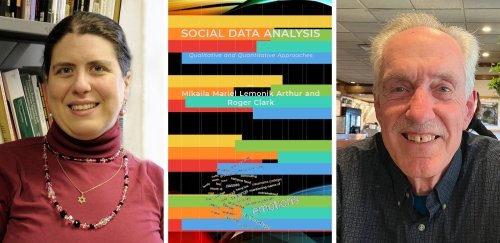RIC’s First Open Textbook Written by Faculty Debuts
- News & Events
- News
- RIC’s First Open Textbook Written by Faculty Debuts

RIC faculty are encouraged to use and compose more open textbooks for their courses.
“Textbook costs have risen nearly 1,000 percent over the last three decades, creating a barrier to education for many college students. To mitigate such expenses, Rhode Island started the Open Textbook Initiative, a challenge to colleges statewide to save students millions of dollars through faculty adoption of open textbooks, which are covered by an open copyright license and available by students, teachers and the public to be accessed or downloaded for free. The five-year challenge, which ended in fall 2022, is estimated to have saved Rhode Island College students at least $1 million in book expenses,” says RIC Associate Professor Dragan Gill, a reference librarian at the Adams Library and co-chair of the Rhode Island Open Textbook Initiative Steering Committee.
Originally, the focus was on saving students money, Gill says. That focus has now expanded to include support of open textbook creation by RIC faculty.
Recently, RIC Professor of Sociology Mikaila Mariel Lemonik Arthur and RIC Professor Emeritus of Sociology Roger Clark (pictured above) wrote their first open textbook, titled, “Social Data Analysis: Qualitative and Quantitative Approaches.”
This 500-page book is designed for upper-level sociology students and contains material culled from Arthur’s teachings over several years at the college. The book received grant support from the Rhode Island College Committee for Faculty Scholarship.
Through Pressbooks, the platform that the college is using for publishing, the book can be read for free online in nine formats. It contains concepts and practical applications to explain why data analysis is done and how to do it.
Gill says she hopes that this will be the first of several forthcoming open textbooks created by faculty. In a 2021 open textbook report drafted by Gill she noted that about 50 or so faculty had adopted the use of open textbooks in their courses and dozens attended workshops about the open textbook process.
“We want faculty to create books of their own,” she says. “Open licenses allow for more creativity and flexibility with their materials. Open educational resources [OER] is more accessible in multiple ways, including being technologically relevant to students and affordable. We’re encouraging faculty to think about the cost, how to teach differently with OER and how to take what they already know and make it widely available to more people.”
Gill adds that open textbooks are as credible as traditional textbooks:
“Open textbooks are created by the same experts putting together expert materials.”
